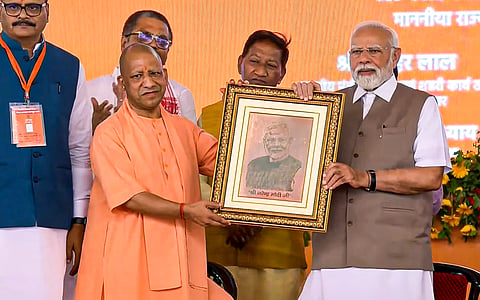

KANPUR: Sending a powerful message on India’s anti-terror strategy, Prime Minister Narendra Modi on Friday said the country would respond decisively to every act of terrorism, regardless of where the threat originates from, as ‘Operation Sindoor’ was still ongoing.
The Prime Minister was addressing a public rally in Kanpur after inaugurating and laying the foundation for 15 development projects related to power, transport, Jal Shakti and other sectors, worth Rs 47,700 crore, during his two-hour visit.
He asserted that India would no longer be bullied by nuclear threats from its neighbours, and outlined three principles guiding the country’s counter-terrorism approach:
1. India will give a befitting reply to every terrorist attack, with the timing, method, and conditions determined solely by the armed forces.
2. India would no longer be intimidated by nuclear threats, nor make decisions based on such intimidation.
3. India would treat the masterminds of terror and the governments that support them with equal resolve.
PM Modi said his Kanpur visit was originally scheduled for April 24 but was cancelled due to the terrorist attack in Pahalgam. He warned that Pakistan’s tactics would no longer succeed, declaring, “If I say it in Kanpuriya style, the enemy will be decimated wherever he is.”
Delivering a strong message on national security, the Prime Minister stated, “India has made its position clear, every terrorist attack will be avenged.”
“Our armed forces will decide the timing and method of the response,” he asserted.
Rejecting the threat of nuclear retaliation as a deterrent, Modi said, “Today’s India does not fear the atomic bomb, nor will it base its decisions on such threats.”
He added that India would no longer accept the excuse of state and non-state actors behind terrorism and that the masterminds and the regimes supporting them would be treated alike.
Referring to India’s strong military response through Operation Sindoor, the Prime Minister said the entire world had witnessed the anger of the country’s daughters and sisters through the operation. “Our forces entered deep into Pakistan and destroyed terrorist hideouts. The Indian Army’s valour forced the Pakistani military to come on its knees and plead for a ceasefire.”
He added that Operation Sindoor had not ended, it had only paused.
Earlier in the day, PM Modi had an emotional interaction with the bereaved family of Shubham Dwivedi at the Kanpur airport. He met Shubham’s widow Aishanya, mother Seema, and father Sanjay Dwivedi.
Focusing on the importance of self-reliance in the defence sector, Modi said that India’s weapons and missiles had caused devastation in the enemy country. He emphasised that achieving self-reliance was crucial not only for the economy but also for national pride.
He recalled that India once heavily depended on other countries for its military needs. “That is why we launched the ‘Atmanirbhar Bharat Abhiyan’, to free the country from this dependence,” he said.
The Prime Minister credited India’s growing defence capabilities to the resolve of a self-reliant nation, which played a key role in the success of recent military operations.
He claimed that Uttar Pradesh was playing a vital role in making the country self-reliant in the defence sector. The PM highlighted that the UP Defence Corridor was attracting major investment, Kanpur’s ordnance factories had been given commercial status, Amethi’s Korba ordnance factory was manufacturing AK-203 rifles, and BrahMos missiles, used effectively during Operation Sindoor, were set to be manufactured in Lucknow.
“UP is going to be the front runner in defence export in the days to come,” said the PM.
In a veiled attack on previous governments, he said they had ignored the state’s industrial needs. “The family-driven governments never thought of giving priority to industrial development and pushed the state out of the race of developing states,” he said.
Highlighting Uttar Pradesh’s transformation into a logistics and industrial hub, Modi said, “The state already has an international airport, and with this year’s budget, we’ve launched ‘Mission Manufacturing’ to further boost local business and industry.”
He also spoke about reforms to the Micro, Small, and Medium Enterprises (MSME) sector, saying it had earlier been misrepresented in ways that discouraged entrepreneurs.
“We have changed that perception and expanded support through this budget. In the last 10 years, we’ve taken several major decisions to empower small businesses,” he said.
Earlier, Uttar Pradesh Chief Minister Yogi Adityanath welcomed the Prime Minister, extending the gratitude of the state. “The way India’s new defence system has given a befitting reply to the enemy is commendable,” he said.
He called it the outcome of the strategic efforts initiated by the Prime Minister over the past decade.
“We are proud of your (PM Modi’s) leadership which has strengthened the nation’s defence and global standing,” Adityanath added.